#yamaguchi prefecture
Explore tagged Tumblr posts
Text

Nagusa Station
#nagusa station#wikipedia#wikipedia pictures#wikimedia commons#railway station#yamaguchi#yamaguchi prefecture#japan#west japan railway company#transportation#railway#train station#japanese countryside#nature
203 notes
·
View notes
Text






Detective Conan (Ep 891 : Bakumatsu Revolution Mystery Tour)
Kogoro, Ran and Conan got entangled in a conspiracy in the heart of Yamaguchi where the seeds of Meiji Restoration was planted.
#detective conan#case closed#anime#japan#anime aesthetic#yamaguchi prefecture#mount fuji#shinkansen#ran mouri#kogoro mouri#conan edogawa#meiji restoration#bakumatsu
16 notes
·
View notes
Text
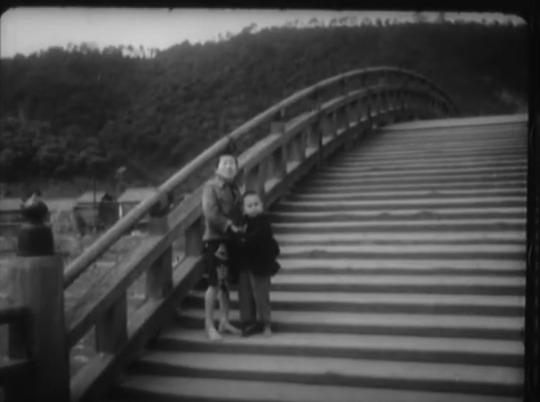
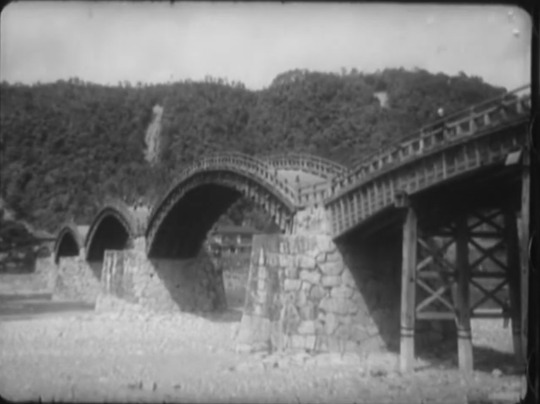
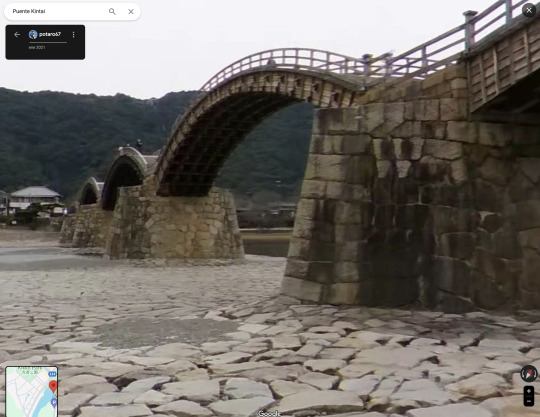
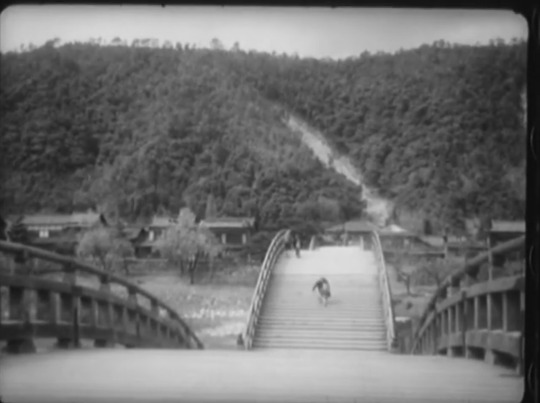
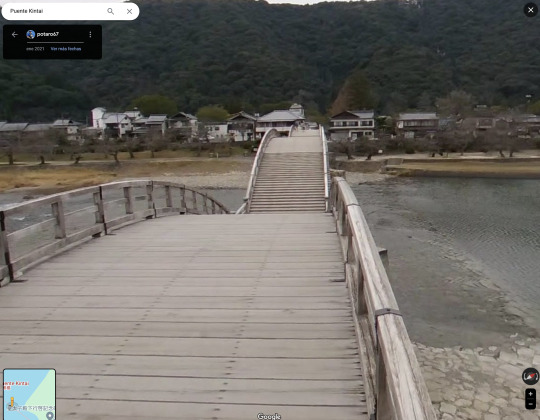
蜂の巣の子供たち / Children of the Beehive Hiroshi Shimizu. 1948
Bridge Kintai Bridge, Iwakuni, Yamaguchi 741-0062, Japan See in map
See in imdb
#hiroshi shimizu#蜂の巣の子供たち#children of the beehive#yamaguchi prefecture#iwakuni#japan#kintai bridge#shunsaku shimamura#movie#cinema#film#location#google maps#street view#1948
10 notes
·
View notes
Text



秋吉台 / Akiyoshidai Quasi-National Park (2) (3) by Ryuichi Miyazaki
8 notes
·
View notes
Photo
via Gridllr.com — for people with lots of Likes!

at Yamaguchi prefecture, Japan. Photography by Ryo Konishi
491 notes
·
View notes
Text
山口旅行⑤
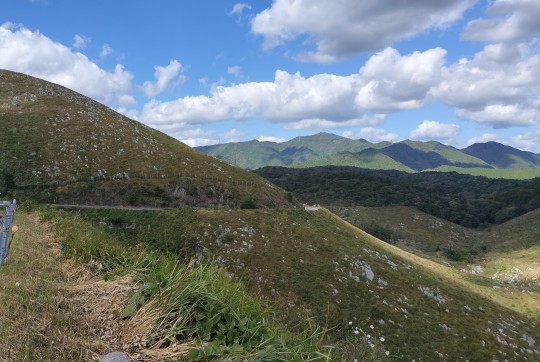
2023.11.1
約20年前、なぜ旅行先に山口県を選んだかというと、アニメ・サザエさんのオープニングで、サザエさんが秋吉台を訪れているのを見て、『いつか実風景を見てみたい!』と憧れていたからなんです(笑)
今回は、夏の長さもあってか草が多い気もしましたが、すごい風景に変わりありません!



そして地下深くには秋芳洞が。日本にもこんな不思議な場所があって、見ているのはそのごく一部かと思うとワクワクします♪
#trip#travel#yamaguchi prefecture#Mine City#山口県#秋吉台#秋芳洞#Akiyoshidai#Akiyoshido Cave#limestone cave#津和野、錦帯橋にもいつか行ってみたい!
0 notes
Text
ナツミカンノハナ

夏みかんの花は、山口県の県花に指定されている花です。夏みかんは山口県を代表する柑橘類で、その花は白い可憐な花を咲かせます。5枚の花弁が重なり合い、中心部が淡い黄色を帯びているのが特徴です。春の訪れを告げる花として知られ、3月から4月にかけて咲き誇ります。夏みかんの花は、その爽やかな香りでも知られており、県内各地で栽培される夏みかんの花々が、春の風物詩となっています。この花は、山口県の自然の豊かさと、県民の温かさを象徴する存在として、県民に愛されています。また、夏みかんの花から採れるハチミツは、上品な甘さと爽やかな香りで人気を集めています。
手抜きイラスト集
#夏みかんの花(山口県)#Summer orange flowers (Yamaguchi Prefecture)#Fiori estivi di mandarino (Prefettura di Yamaguchi)#Flores de mandarina de verano (Prefectura de Yamaguchi)#Sommerliche Mandarinenblüten (Präfektur Yamaguchi)#Fleurs de mandarine d'été (préfecture de Yamaguchi)#手抜きイラスト#Japonais#bearbench#art#artwork#illustration#painting
1 note
·
View note
Text
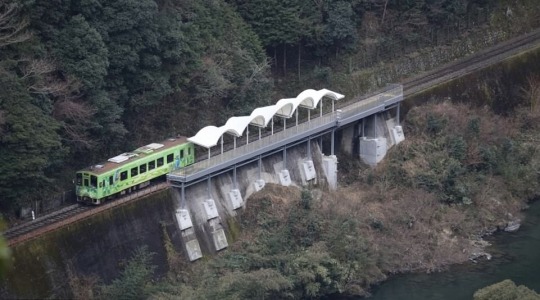

Seiryu Miharashi Station (The Ghost Station) is a railway station on the Nishikigawa Seiryū Line in Yamaguchi Prefecture, Japan. It has no entrances or exits, meant only to get fresh air and enjoy the scenery.
10K notes
·
View notes
Text
"Pitan" runs to a cafe in Nagato City, Yamaguchi Prefecture.
162 notes
·
View notes
Text
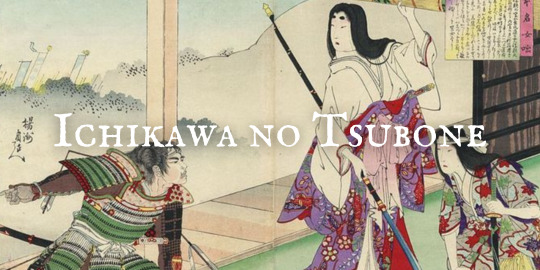
Little is known about Ichikawa no Tsubone’s life apart from her remarkable military exploit. Her exact birth date and parentage remain uncertain. She was married to Lord Ichikawa Tsuneyoshi, a vassal of the Mōri Clan, though it is unclear whether she was the mother of his two biological sons.
Ichikawa no Tsubone is remembered for her extraordinary bravery in the face of danger. In 1569, when her husband left to join a military campaign, he entrusted Kōnomine Castle (located in present-day Yamaguchi Prefecture) to her. Soon after, the castle came under siege by Ōuchi Teruhiro, who commanded a force of 6,000 soldiers. In contrast, Ichikawa no Tsubone had only 300 soldiers under her command.
Likely between the ages of 40 and 50 at the time, given her husband’s age, she did not let the dire circumstances shake her resolve. Donning armor and wielding a naginata, she fought alongside her ladies-in-waiting, rallying her soldiers and urging them to stand their ground.
For ten days, Ichikawa no Tsubone and her small force endured intense fighting and successfully held the castle. Their resistance proved effective until reinforcements arrived, turning the tide in her favor. Her courage earned her a letter of commendation from Mōri Terumoto, praising her exceptional exploit.
Ichikawa no Tsubone passed away on April 5, 1585.
Enjoyed this post? You can support me on Ko-fi!
Further reading
市川局
市川局(いちかわのつぼね)
Sylvester Kate, Women and Martial Art in Japan
#ichikawa no tsubone#japan#japanese history#history#women in history#women's history#historyedit#warrior women#asian history#women warriors#samurai women
77 notes
·
View notes
Text
A fun element to Otherside Picnic vol 8 (spoilers ahead after the break, if you're still planning to read it) is an easter egg about the location of Toriko's apartment. Actually, "easter egg" might be underselling it a bit; it has a huge amount of thematic relevance to Toriko's character. So here's the easter egg: if you follow Sorawo's description of her path to Toriko's apartment, you can actually find the building on Google Maps.
The train arrived in Nippori. Pushed by the rush of people, I got off, went down the stairs, and out the gate. I climbed the hill, out of breath, in the unrelenting rain. The wall of a graveyard continued along the left-hand side. Turning onto a side street at the top of the hill, I could see Toriko’s apartment in the middle of a residential area ...the building uses an autolock system... Getting off on the fourth floor, I headed into the hallway. The town I could see over the chest-high wall was misty in the rain.
The fun thing about this is that Sorawo's narration is just specific enough to follow along. In a way, it's an invitation to the reader to imitate Sorawo. Prior to the events of the series, she spent time tracking down the sites of ghost stories from the minor details that leaked into their narration. Tracking down where the weirdness happened placed it in context; stories from the edge of reality seem more reliable when the reality can be charted.
So, let's do it. Sorawo mentions a graveyard wall - this can only be Yanaka Graveyard, located on the west side of Nippori Station. Yanaka is located on the former grounds of the Tenno-ji Buddhist temple, and is one of Tokyo's largest cemetaries by area. It is the resting site of the final Tokugawa Shogun, as well as a who's who of Meiji-era academics, literati, and government officials.
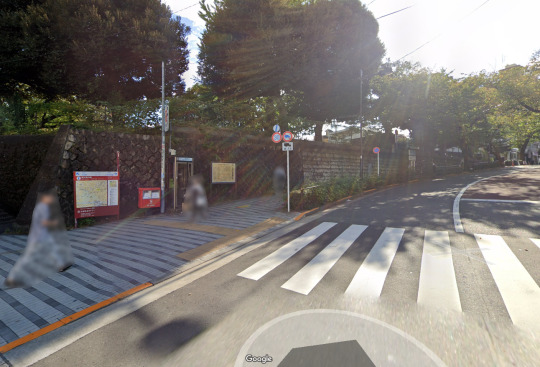
The road along the north edge of Yanaka Graveyard goes up a steep hill, and where it reaches the top, a side road splits off on the left to go into a residential area. Going into street view shows that all of the buildings along this road are only two or three stories tall, except for a building at the very back. It's four stories tall. The building has an auto lock system at the front door, and chest high walls along the hallways to the apartments. Bingo.
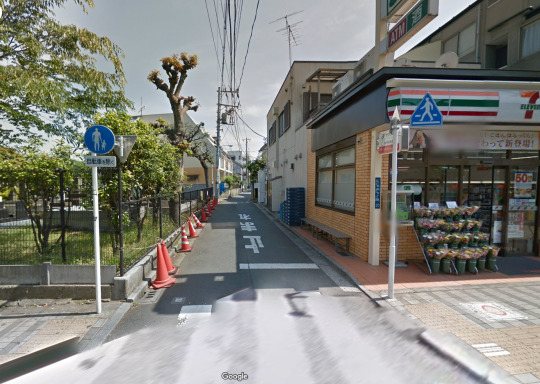
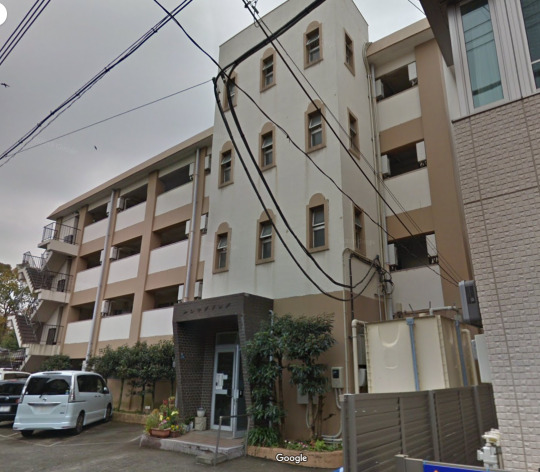
The fun part of this is the name of the apartment complex: 山口マンション (Yamaguchi [Mountain Gate] Mansion).
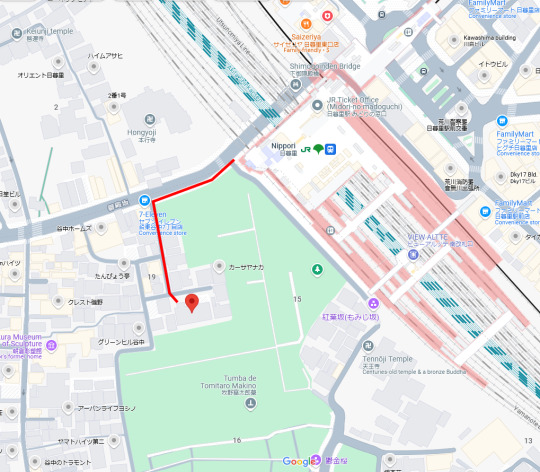
The first part of the thematic relevance here is its relationship to Satsuki's monologue about being brought into the Otherside.
"What happens to the people who don't return?" "Who knows? They probably die, right?" "Life and death aren't the issue. Once you get to that point, that is." My brow furrowed. "What do you think mountains are made of?" Satsuki asked, smiling. "Trees and stuff?" I said without putting much thought into it. When I thought of mountains, the image that came to mind for me was the mountains of my home prefecture, Akita, covered in green. "If trees were sapient, they wouldn't think of themselves as a mountain. Only as a single tree. It's the same concept. People who go into the mountains, regardless of their mental state, are still people. But the wind that blows through the trees. The rocks. The birds. Every speck of rock covering the bedrock. The beasts, hiding in their dens. The ancient mollusks, sleeping in a geologic fold. The morning dew in a spider's web. The bacteria and microorganisms in the soil, breaking down the body. None of these individual constituting elements is the mountain on its own, yet the mountain is made up of them. So it is for those called by the mountain. Living or dead." She raised her hand, pointing all five fingers at herself. "That is how it is for me." Uncurling her fingers, she pointed at me. "That is how it is for you."
This "mountain gate" connection also ties back to Sorawo's previous visit to Toriko's apartment in File 4, where she opened the door to the apartment and encountered the ultrablue void of the Otherside. Thematically, this places Toriko's apartment at the interface between the surface world and the Otherside. The back of the building also abuts Yanaka Graveyard, and so thematically, also forms an interface between life and death.
Sorawo touches on this latter theme in the back half of File 26, when Toriko forces herself on Sorawo in her parents' bedroom. Sorawo becomes profoundly uncomfortable - equally, if not more disturbed by her surroundings than Toriko's behavior. After relocating to Toriko's bedroom, Sorawo realizes the following:
This home was a grave, and Toriko the crypt keeper—that's the image that I was getting. The sudden feeling of resistance I'd felt when we were in the bedroom might have come from that mental association. Even if it weren't the place where her parents had once slept, it was almost like flirting in front of a Buddhist altar. After entering Toriko's room, I finally got it. This room has color. It's the room of a living person.
Toriko's bedroom forms a small bubble of life in an otherwise dead house. The interface between life and death isn't simply close to Toriko's living space, it is actively defined by it. This ties in closely to Toriko's character, given that she's admitted her pushiness to do relationship things in the Otherside is driven by a fear of loss. Her mothers suddenly died, and Satsuki suddenly vanished. All she has left of them is her cherished memories, and she wants to form those memories with Sorawo, just in case.
Another element in play here is Sorawo's relationship to the Otherside. At multiple points in the series, the Otherside seems to suddenly draw closer when Sorawo gets stressed out with her thoughts about her relationship with Toriko. The most obvious example is in the hot springs when the mannequins appear immediately after Sorawo feels backed into a corner with Toriko's "cute boobs" comment, but those fears are also linked to Hasshaku-sama (both times the entity appears as Sorawo contemplates jealousy and the possibility that Toriko will be taken from her), Satsuki's surface world appearance (Kozakura implying Sorawo is manifesting Satsuki through her jealous fixation), the the love hotel girls' party (the lion dancers appear as Sorawo is trying to avoid a romantic bath with Toriko), and Satsuki's appearance in vol 7 (when Sorawo is considering where she would be without Toriko). In a sense, the terrifying aspects of the Otherside to Sorawo are closely related to the terrifying aspects of a defined relationship with Toriko.
One puzzle piece in play is a conversation from vol 7, as Sorawo, Kozakura, and Toriko are figuring out their approach to exorcize Satsuki. They discuss the concept of "atmosphere" and its ability to transmit emotions, particularly fear, and explore ways to change that atmosphere. Toriko mentions that she's mostly heard ghost stories where sex changes the atmosphere. Sorawo then elaborates to a doubtful Kozakura with the following:
No, it's true. There's stories where they were in a real bad situation, but then they started saying all sorts of lewd things and they survived. I don't tend to say that ghosts are this way or that, but sex is the source of life, so that makes it the polar opposite of ghosts, which belong to the world of the dead... At least, there's that sort of reasoning. It's an idea that's been around since ancient times.
Sorawo also goes on to mention that in some situations, the atmosphere can be overwritten, but in others, these attempts only reinforce it more strongly.
The thing about ghost stories is that for all its other indiscretions, it's an elegant genre in strange ways. There's not a lot of bawdy stories in it. Maybe that's because if you're trying to scare someone, and then sexual elements get involved, it hurts the atmosphere. Anyway, I only brought up the sex stuff as an example of how the atmosphere can get changed. It's too weak to be her weakness. There's some real nasty ghost stories with sexual elements, and there are people who've had scary experiences at love hotels.
All of these concepts start to interweave with one another when the two relocate to Toriko's bedroom. Sorawo immediately notices a change in Toriko's demeanor.
Her expression looked uneasy, without composure. She wanted me, but also feared rejection. Despite the way she'd been breathing heavily through her nose as she led me here by the hand, now Toriko was just standing there awkwardly. As if once she'd dragged me into her room she didn't know what to do anymore. Maybe as we entered what remained of the domain of the living inside this house of the dead, Toriko had come back to life.
This scene firmly links Toriko's fear of the Otherside (death) to Sorawo's fear of the Otherside (relationships). In her moms' bedroom, Toriko had been demanding, frustrated, and angry - the malicious emotional states traditionally occupied by spirits in ghost stories! However, she settles down when she enters her own bedroom. For Sorawo, passing through this interface changes Toriko from an unknowable force who inspires fear into a very human entity with whom she can sit down and discuss the uncomfortable topic of sex. In turn, this allows Toriko to an explore an aspect of their relationship that she views as fundamentally life-affirming. After this scene their Othersides are no longer totally different, or inspire mind-numbing terror, but are now operating on a common logic.
The concept of an atmosphere comes up again just after their first try at sex. Toriko has finally found a turn-on for Sorawo, and Sorawo describes the feeling in the same analytical voice she uses for ghost stories.
Until mere moments ago, our nakedness had been no more than that. Just another awkward state of undress, like when we got in the bath. Not anymore. My nudity, and Toriko's, took on entirely new meaning. One little switch inside of me got flipped, and it caused a startlingly dramatic change in my perception. It was mystifying how, as that change occurred, it swallowed up the entire atmosphere of the scene, including Toriko. Stuff like this can happen... I thought in a daze. The room was dominated by my lust which had suddenly materialized. As it overlapped with Toriko's desire, the atmosphere inside the room became something kind of extraordinary.
Prior to their second go at sex, Sorawo and Toriko take a moment to talk over their last remaining fears about sex - using their Otherside-altered body parts on one another. They come to the mutual realization that they have both been afraid of harming one another, but not of being harmed by the other. This last discussion is important, because it totally diffuses their fears around sexuality prior to indulging it. So as they travel into the deepest reaches of the Otherside, they have total trust and intimacy with one another - and an absolute lack of fear relating to what the Otherside represents to them.
The color of the calm world was blue. As we whorled together, intertwining, the ultrablue abyss spread out endlessly beneath us. We didn't fear it. Because this was our place. No one was watching us. No one knew we were here. We were the only ones watching, and the only ones who knew. So the only things Toriko and I have to fear are each other.
"Was it just me who wasn't that scared?" "Nah, it was the same for me. Everything around us was blue, but it wasn't scary." "I wonder why?" "I dunno, maybe because we were on the side that scared people?" Toriko got a mystified look on her face when I said that. "The side that scared people? You mean the Otherside's side?" "We weren't human anymore, were we, Toriko? When we were there." "...Yeah." Toriko suddenly moved closer to me and chomped down on my ear.
So to bring this full circle, this is why I love this particular easter egg, and Otherside Picnic in general. The setting is treated as an important aspect of the story, and it is carefully chosen for its emotional content and thematic relevance. Toriko's apartment isn't just some random place in an upscale neighborhood of Tokyo. It's a fundamental part of who Toriko is as a person. It's a location that lends a huge amount of thematic subtext to Otherside Picnic as a relationship story, and to the reader's interpretation of the Otherside.
Is it a metaphor for death? For queerness? For our ability to truly bridge the gap in understanding between self and non-self? The reader is invited to imitate Sorawo, and in doing so, finds a treasure trove of understanding. The little rush of discovery shows us what keeps Sorawo interested in exploring a totally alien world and trying to understand its workings.
Miyazawa's writing actively rewards readers for engaging with every little bit of the story, and it really tickles the analytical part of my brain.
161 notes
·
View notes
Text
wait… has anyone drawn fanart of yuji itadori with the karasuno boys yet? you know since he’s from the miyagi prefecture as well?
he would’ve absolutely excelled on that volleyball team. phenomenal all-around player. he would’ve been besties with tsukishima and yamaguchi because lowkey nerds but would’ve gotten along with anyone with insane energy like hinata, tanaka, and nishinoya.
and, wow, does that boy care so much about his teammates, much like sugawara. he’s so humble in the face of his opponents, which pisses off players like oikawa and atsumu, but pleases ushijima and kita.
unlike tanaka and nishinoya, he doesn’t notice or care for attention from women. he has so much respect for them, he knows he’s too immature to date anyone until after he graduates high school (even though he’s actually very mature for his age).
when he’s of working age, he starts taking shifts at ukai’s store on the weekends to help out his grandfather. ukai would have never let anyone else on karasuno work at his store, but he trusts yuji completely.
basically what I’m trying to say is yuji deserves a happy life just being good at volleyball and hanging out with they boys… but instead he’s… well… you know.
#jujutsu kaisen#jjk#haikyuu#hq#hq!!#itadori yuji#yuji itadori#jjk yuji#itadori yuuji#haikyuu!!#hinata shoyo#hinata shoyuo#tsukishima kei#yamaguchi tadashi#tanaka ryuunosuke#nishinoya yuu#oikawa tooru#kita shinsuke#ushijima wakatoshi#miya atsumu
81 notes
·
View notes
Photo












Hero SP (2006)
#hero#hero sp#hero 2006#haruka ayase#ayase haruka#kimura takuya#takuya kimura#yamaguchi prefecture#japan#japan countryside#rural japan#japanese drama#j drama#jdrama#dorama#asian drama#legal drama
7 notes
·
View notes
Text
ˏˋ°•*⁀➷ shobio fic recs༉‧₊˚✧
i like the way your clothes smell by Mysecretfanmoments ✰
Relationship(s): Hinata Shouyou/Kageyama Tobio
Rating: M
Word-Count: 75k
Summary:
Power outages, ghost stories, and the presence of a certain orange-haired boy lead to bad decision-making on Tobio's part. He'd planned to keep his crush a secret; the universe has other plans.
somniloquy by emleewrites ✰
Relationship(s): Hinata Shouyou/Kageyama Tobio
Rating: T
Word-Count: 12k
Summary:
“Hi-Hinata…” The spark of awareness ignites and Shouyou blinks his eyes open again fully, humming in response to his name. Kageyama doesn’t reply, as he’s still completely asleep, shuffling slightly as his breaths start to catch in the beginnings of snores. “Kageyama?” Shouyou stage whispers. “Hinata,” Kageyama grunts back, before smacking his lips and devolving fully into snoring.
In which Shouyou falls in love slowly during his high school years, and Kageyama talks in his sleep.
summers spent in your light by yu_writes
Relationship(s): Hinata Shouyou/Kageyama Tobio, Tsukishima Kei/Yamaguchi Tadashi
Rating: T
Word-Count: 10k
Summary:
The final scores flash up on the screen. Kageyama gapes at the cheerfully-blinking animations. “There’s no way you’re that good on your first try.” Hinata grins. “Who said it was my first try?” “You—!” Hinata sticks his tongue out at him as the arcade machine spits out a small stack of tickets. And glancing over, next to their drumset—both of their mouths drop—sits a flushed, triumphant Yachi and a thoroughly-trounced-looking Tsukishima. “Wow, I didn’t realize how easy it is to get the hang of this!” Yachi beams at them as the machine spits out a small mountain of tickets. Yamaguchi, who has been watching over Tsukishima’s shoulder, muffles his laugh at the petulant look on Tsukishima’s face.
the karasuno first years, who are then second years, and then third years. and, of course, kageyama and hinata, who are... well, kageyama and hinata.
life is a highway by emleewrites ✰
Relationship(s): Hinata Shouyou/Kageyama Tobio
Rating: T
Word-Count: 98k
Summary:
Kageyama Tobio is a professional racing driver, the new rookie sensation who's about to take home the Piston Cup in his first year. But a race run recklessly leads to an unprecedented three-way tie, and a tie breaker race is set for a week's time. On the way to the International Speedway, Kageyama gets lost, and ends up crashing into Karasuno Springs - a small country town in the middle of nowhere, ruining their main road in the process. Forced to stay and fix it, Kageyama feels the whole thing is a waste of time, until he meets the town's handyman - Hinata Shouyou, a local dirt track racer. They're very different, but a shared passion for racing draws Kageyama in, as he tries to work out why Hinata is just a handyman in the first place despite his talent for racing. And over the course of the week he ends up discovering that maybe there's more to life than winning races all by himself.
A racing AU; based on the story of Pixar's Cars, but everybody is human.
Saffron and Cayenne Pepper by dontsaycrazy
Relationship(s): Hinata Shouyou/Kageyama Tobio, Shimizu Kiyoko/Yachi Hitoka (Mentioned)
Rating: T
Word-Count: 30k
Summary:
Cooking is hard. Even if you have your very attractive, very grumpy neighbor there to help you.
In which Hinata's lack of cooking skills are a danger to him and others. Luckily (or not), Kageyama is willing to teach him, if only for the sake of avoiding any burned down apartments.
You Can't Play Volleyball In A Blizzard by KingsHighway ✰
Relationship(s): Hinata Shouyou/Kageyama Tobio
Rating: T
Word-Count: 12k
Summary:
The "blizzard of the century" comes bearing down on Miyagi Prefecture, closing down schools and trapping everyone in their homes. With nothing to do to pass the time, and an unlimited amount of energy, Hinata finds an unlikely texting buddy in his volleyball partner Kageyama. But it's just texting, it can't matter that much, can it?
burnt by sunbeams by emleewrites ✰
Relationship(s): Hinata Shouyou/Kageyama Tobio
Rating: T
Word-Count: 12k
Summary:
Tobio drops his hands from his face at Hinata’s bright voice and looks down. Hinata beams up at him, wide and blinding, a ball of sunshine on a gymnasium floor. Tobio kind of feels like he’s burning when Hinata looks like this – sunbeams personified – but that’s okay. He’ll happily spend the rest of his life getting burned by Hinata Shouyou.
Kageyama thinks that being in a relationship seems to be simple at first. It's just Hinata; there's just a lot more kissing involved. But no relationship is without challenges. And for Kageyama, he'll weather them all, so long as he gets to bask in the sun.
Hinata and Kageyama: a relationship study.
thirty-three days of mist and mountains by tinygumdrops (curryramyeon)
Relationship(s): Hinata Shouyou/Kageyama Tobio
Rating: T
Word-Count: 36k
Summary:
Tobio runs by himself every day. Even though he can't shake off that awful feeling that something's closing in on him, he still does it. It's habit now. When he gets a phone call that Hinata Shouyou is thinking of coming to Italy, Tobio feels like he has to run even faster.
Or: Tobio has a month to prepare himself before his high school rival comes to visit him. They haven't spoken to each other for two years, and Tobio can't even remember what food Hinata likes. He's got a lot to think about.
In Transit by Mysecretfanmoments ✰
Relationship(s): Hinata Shouyou/Kageyama Tobio
Rating: T
Word-Count: 4k
Summary:
Hinata finds that he likes standing close to Kageyama on buses and trains. It doesn't mean anything--probably. Maybe.
a long distance type of love by xllx (exasperatedmoron)
Relationship(s): Hinata Shouyou/Kageyama Tobio
Rating: T
Word-Count: 42k
Summary:
shouyou and tobio learn about the world and each other from 17,380km apart.
aka; two dumbasses and their ability to maintain a long distance relationship despite being absolute wrecks when it came to everything else in their lives. (oh, and they’re engaged)
Olympic Thirsting Hours by Kelpiejz
Relationship(s): Hinata Shouyou/Kageyama Tobio (Minor)
Rating: T
Word-Count: 4k
Summary:
Alone in Brazil and desperate for some kind of human connection that won't make him homesick, Hinata Shouyou decides his best bet is to communicate in broken English with strangers over the internet. They only have one thing in common - volleyball. sunshinetangerine: not watch olympics now, at work sunshinetangerine: but kageyama very good setter AnArchyCountry: he really is, wow thirstea: just snuck my phone in class to see a photo and holy hell he’s hot sunshinetangerine: yes sunshinetangerine: playing volley a lot get hot sunshinetangerine: drink lot of water after!! (^▽^) thirstea: oh sweetie, not that kind of hot
Or; a look at Hinata's growth after high school from the perspective of people who don't know who he is.
discovering the smile of one kageyama tobio by emleewrites ✰
Relationship(s): Hinata Shouyou/Kageyama Tobio
Rating: T
Word-Count: 8k
Summary:
Kageyama blinks once before a grin of his own spreads over his face. Shouyou’s breath halts in his lungs at the sight, and he wills for time to stop, just so that he can drink it in. He sees it sometimes when they’re playing - Kageyama’s fierce smile when they pull a combo off just right, when they show their opponents how possible the impossible can really be. But then there’s another serve, another rally, and the moment is gone. 'Shame,' Shouyou thinks to himself, as he lets his eyes roam over Kageyama’s stupidly happy face, taking in the creases that are from joy rather than frowning for a change. 'It’s a really nice smile.'
In which it's their third, and final, year in high school and Hinata has only one goal: to make Kageyama smile outside of volleyball.
77 notes
·
View notes
Text





里の春ーSpring in the Village (2) (3) (4) (5) by kurumaebi
Via Flickr:
(3) (4) (5) 菜の花畑にて ー In the Field of Canola flower field
7 notes
·
View notes
Text

'Evening Glow Over the River Adogawa'. Nishijima Katsuyuki. (Japan, Yamaguchi Prefecture, born 1945).
100 notes
·
View notes